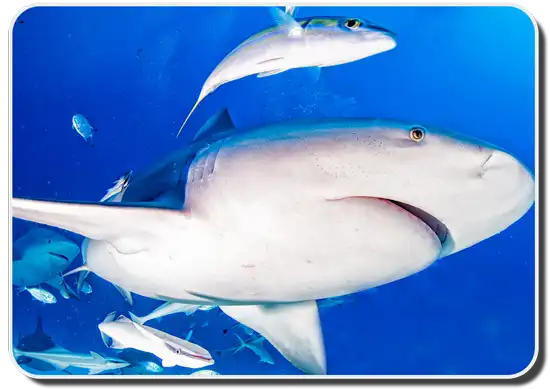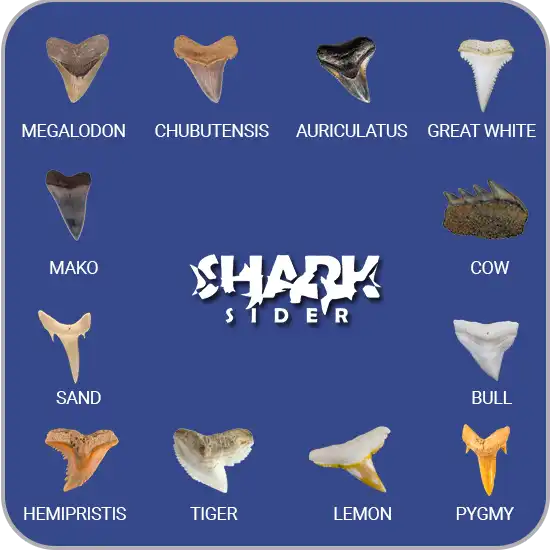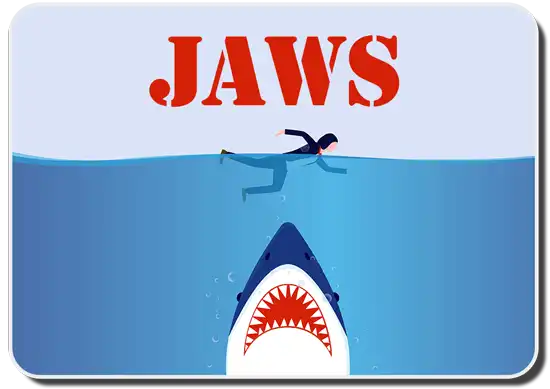Whether you need info for a school project or are simply intrigued by this amazing and beautiful creature, this page has some pretty cool facts about sharks that you probably haven’t heard before. Sharks are one of the most misunderstood

Bite Me! On second thought… Please Don’t!
After you wake up, brushing your teeth might be at the top of your list of things to do. Well, here are a few facts about shark teeth to go with your toothpaste! While you’re brushing in the hopes of keeping your teeth healthy and strong, sharks are continuously growing new rows of triangular teeth that need no jawbone to keep them in place. They are entrenched in the flesh.
Several rows of these teeth are patiently killing time (and whatever else they choose to kill) behind the current row of teeth. A sharks main row of teeth is usually replaced in a mere 8 days! Absolutely no brushing required! The ocean floor is literally covered with millions and millions of shark teeth.
Growing Teeth Forever – A Tooth Fairy’s Dream!!
A typical shark will grow (and lose) thousands of new teeth over the course of its life. So the question is, would you brush your teeth nearly as often if you were going to have 30,000 of them over the duration of your human life? Well that’s about how many a shark will have. So needless to say, he or she is not concerned with the ones left behind, or insomeone’s behind for that matter!
So the next time someone calls you big mouth, think about a shark’s mouth and its ability to hold 300 rows of teeth with hundreds of teeth in each row, then look at them knowing they are fortunate that your mouth is actually quite small compared to a shark.

Busting The Myth About Violent Sharks
It’s the shark’s reputation for being deadly that you’ve probably heard most about. Although we’ve just covered the 30,000 reasons why they can kill you, you might be surprised to discover humans are not part of the sharks diet and they aren’t quite as scary as you may think.

Humans Taste Awful!
Yap, sharks simply don’t like the taste of us. We’re about as untasty as they come. When you think about it, this makes perfect sense. Humans are rarely, if ever, completely devoured by a shark. Seeing how sharks only use their teeth to bite into their prey enough to swallow it down (mostly whole), there must be something else that happens when they bite a human and leave them uneaten. Are they aggressive? Are they protecting their space? Usually, the reason a shark will bit is simply out of mistaken identity or curiosity.

Sharks Are Curious And Intelligent Animals
You see, sharks use a process similar to a human toddler. If they bite into something and if don’t like it, they spew it out of their mouths. They also like to test things with their mouths. If they see something they’ve never seen before, they may “test bite” the object to see if it’s a food source. Many human legs are also mistaken for other animals like seals which are a part of the sharks diet. Once the shark bites and discovers it’s not the tasty treat he thought it would be, the shark will go elsewhere. Unfortunately for the human, the damage has already been done!
How Often Are Humans Hurt By Sharks?
Most attacks on humans are provoked attacks, usually when a shark bites a fisherman. Each year, there are less than 100 shark attacks on humans across the globe and most of those are not fatal. In fact, on average, there are an average of 4.2 fatal shark attacks on humans every year, worldwide.
Sharks Have Been Around For A Very Long Time!
Though many have affirmed a shark’s life expectancy to be up to 25 years, scientists have discovered that the Great White Shark and Spiny Dogfish can live over 100 years. This comes as no surprise since they have a naturally high amount of Vitamin A, but also because they have been around for more than 300 million years! That’s right, sharks have been around since before dinosaurs even roamed the earth. Pretty remarkable, right!? The history of sharks is still shrouded in much mystery, but if you want to learn more, check out our page on the evolution of sharks.
A noted difference between sharks now and those of ancient times is what is known as aprotrusile jaw. Maybe prey in the old (very old) days weren’t as tough as they have become, this protrusile jaw is what gives modern-day sharks their extremely powerful bite.
Sleep? Not In The Shark World!
Everything we do as humans typically happens after a good nights sleep (or day’s sleep if you’re a night owl like me). While humans need about 7 or 8 hours of sleep each night to stay healthy, sharks don’t sleep at all! In seawater, a shark can sink because its body is denser than the water itself, therefore they don’t sleep, but instead become very still in what can best be described as resting. Part of their living process is continuous motion.

The Speed Of Sharks
The Shortfin Mako Shark is the fastest species of shark to date and can swim up to 65mph (over 100kph)! I’m sure I don’t need to point out that any shark will out swim you, but knowing there’s at least one that can reach a speed limit for cars is very impressive!
Some Sharks Are Big – REALLY Big!
What Shortfin Mako Sharks have in speed, the Whale Shark has in size. Perfectly named, a Whale Shark can grow to be as large as a school bus! In case you’ve blocked out having to ride one or they don’t have them in your neck of the world, school buses can be up to 37ft in length. Since most facts about sharks are typically reserved for the well known Great White Shark, let’s compare. They can grow 10 inches a year until they reach 12 to 14 feet. It’s easy to see that there is no comparison to the Whale Shark when it comes to length… yes, that’s what she said (ahem).
We Have Much To Learn
Ultimately, when it comes to facts about sharks, there is still so much more for us to learn. We often fear what we don’t understand, and we have lived in fear of these beautiful animals for so long. While we’ve only touched the surface of who they are and why they’re here, as we learn more about them, we realize more and more that sharks are far more important to the fragile marine ecosystem than we ever imagined.
